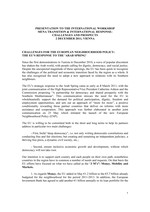Challenges for the European Neighbourhood Policy: EU response to the Arab Spring

Alar Oljum
presented at: MENA Transition and International Response: Challenges and Prospects (02 Dec 2011)
The current social and political turmoil in the Middle East and North Africa (MENA) is an indication that this region is entering a process of transition with far-reaching political, economic, social and institutional consequences whose outcomes are far from certain. A careful analysis of socio-economic starting conditions in the region, similarities and distinct features of individual countries, are highly relevant for the adoption of appropriate policies both within and without the MENA region. The outcome of the processes of democratization and economic transition will crucially depend upon the ability of the MENA countries to provide appropriate economic opportunities to its citizens, in particular the young. In turn, political and institutional changes are necessary for these economies to grow and embark on a process of inclusive and sustainable catching-up. The experiences with recent transitions in Central, East and Southeast European countries (CESEE) may provide interesting references. The European Neighbourhood Policy and IFI programmes may play an important role in supporting the transition process.
Countries covered: MENA